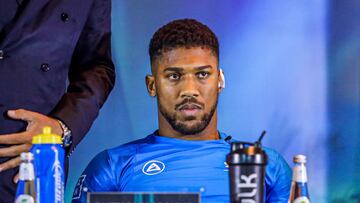Joshua vs Usyk 2: What is Anthony Joshua’s boxing record?
In a blazing career that saw Anthony Joshua shoot to the top of the boxing world in a short span of time, he needs to climb up off the mat once again


When the London Olympics came around in 2012, most people in the boxing world had not heard of Anthony Joshua. The year before, he had burst onto the international scene when he defeated reigning world and Olympic champion Roberto Cammarelle in the Baku World Championships on the way to winning a silver medal.
Getting a late start in the sport, Anthony Joshua’s road to boxing was not straight and defined. A few youthful indiscretions led the teenager to be put on police bail in north London, wearing an ankle monitor to ensure that he stayed out of trouble. To fill his days, he would follow a cousin to the local boxing gym and found his calling at the age of 18.
Once in the ring, though, his path was blazed before him, and like a rocket he shot through the boxing world. Often unassuming before the bout, he would be dismissed at every level as lacking style, finesse, or experience, and at every turn he would simply march through opponents as if they weren’t there. Each bout felt like an Anthony Joshua exhibition when it ended.
10 years ago today @anthonyjoshua won Olympic gold in London. Next week he’ll seek to reclaim the unified pro heavyweight titles. Here’s his rookie card from the 2012 Panini Olympic set in my #boxing collection. @EddieHearn @MatchroomBoxing @FrankSmith #UsykJoshua2 pic.twitter.com/AIQQpwsaaM
— Dan Rafael (@DanRafael1) August 12, 2022
After walking away with the Olympic Gold in London, once again by defeating Cammarelle, this time in the final, he faced yet more criticism that he was the recipient of a “home decision.” Having accomplished all that he had set out to do in the amateur game, he turned professional the following year.
Joshua’s rise through the pro ranks was as meteoric as his rise through the amateurs. Often criticised as a straight ahead one-two puncher, a fighter with a big right hand but very little lateral ability, he countered this by simply walking through fights as if to say, “You want me to do something else? Then stop me.” Nobody could.
In a nod to his relative lack of experience in the amateur game, he was squared off with largely journeyman-like fighters in the beginning of his career, allowing him time to hone his craft against stiff, but ultimately non-threatening competition. The critiques rose in pitch at this fact, and his first true threat was in the form of Gary Cornish, in his 15th professional bout. He dropped the undefeated Cornish with an explosive right hand just 90 seconds into the first round.
Anthony Joshua KO'd Gary Cornish in 90 seconds last night. More here: http://t.co/1xTgGMb9uk pic.twitter.com/TbKQTpEBa8
— Sky Sports Boxing (@SkySportsBoxing) September 13, 2015
After facing Dillian Whyte in a grudge match, which Joshua handled with a bone-jarring uppercut in the seventh, he was given a shot, at only 16-0, to challenge Charles Martin for the IBF heavyweight title. Leaning on that heavy right hand once more, he dealt the lackluster Martin a solid knockout in the second round.
Now the champion, Joshua defended his title to no less criticism several times before taking on the unification bout with WBA champ Wladimir Klitschko. While the critics were certain that the master craftsman from Kyiv would take the young champion apart, the fight showed that Joshua could indeed adapt his style to suit the bout and that he could recover well from a knockdown.
🗓️ #OnThisDay in 2017...
— Matchroom Boxing (@MatchroomBoxing) April 29, 2022
🚀 @anthonyjoshua stopped Wladimir Klitschko at Wembley Stadium!
What a fight, what a night 👌 pic.twitter.com/AS7LX6tdTg
After a tasty bout against Carlos Takam, who came in as a late replacement for an injured Kubrat Pulev, Joshua once again unified belts, this time being forced to go the full 12 rounds to take the WBO title off of Joseph Parker.
Now the unified champion with three of the four major belts, Joshua was involved only in the biggest fights around. In his seventh defense, he found himself stunned by the superior hand speed of Andy Ruiz Jr and saw his titles slip through his fingers when he was stopped in the seventh round.
Needing to find a way to climb back up after this first defeat in his career, Anthony Joshua went back to the gym and dropped ten pounds in an effort to match some of Ruiz’s speed for the rematch. Showing good lateral movement for the first time in his career, Joshua outboxed rather than out punched an opponent to get the unanimous decision and reclaim his titles.
Related stories
After successfully defending them to the long-delayed Kubrat Pulev, Anthony Joshua’s camp were unable to hammer out a deal with Tyson Fury, and so he faced the WBO mandatory challenger in Oleksander Usyk. Usyk was an entirely different beast than any Joshua had faced previously, having speed and agility on his side to accompany his punch power, and the Ukranian challenger handed Joshua his second career defeat, this time on points rather than stoppage.
Now, at 24 - 2 and looking to become world champion for a third time, Anthony Joshua will have to do something that he has shown himself capable of before: he will have to climb off the mat. If he can do that, he will certainly give his critics the best response possible, by cementing his legacy in the pantheon of all-time great heavyweight boxers.
Vitali Klitschko says Anthony Joshua should use his rematch with Oleksandr Usyk to prove he deserves a shot at Tyson Fury 😤 pic.twitter.com/DpEUVCrobi
— DAZN Boxing (@DAZNBoxing) January 30, 2022

